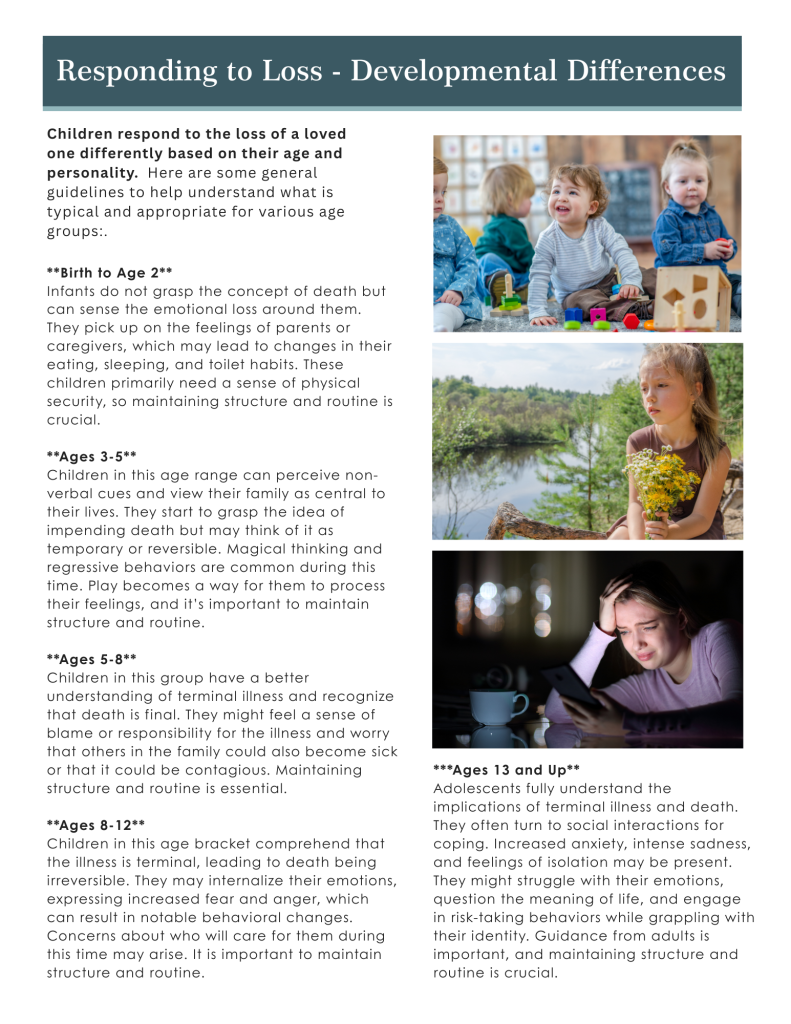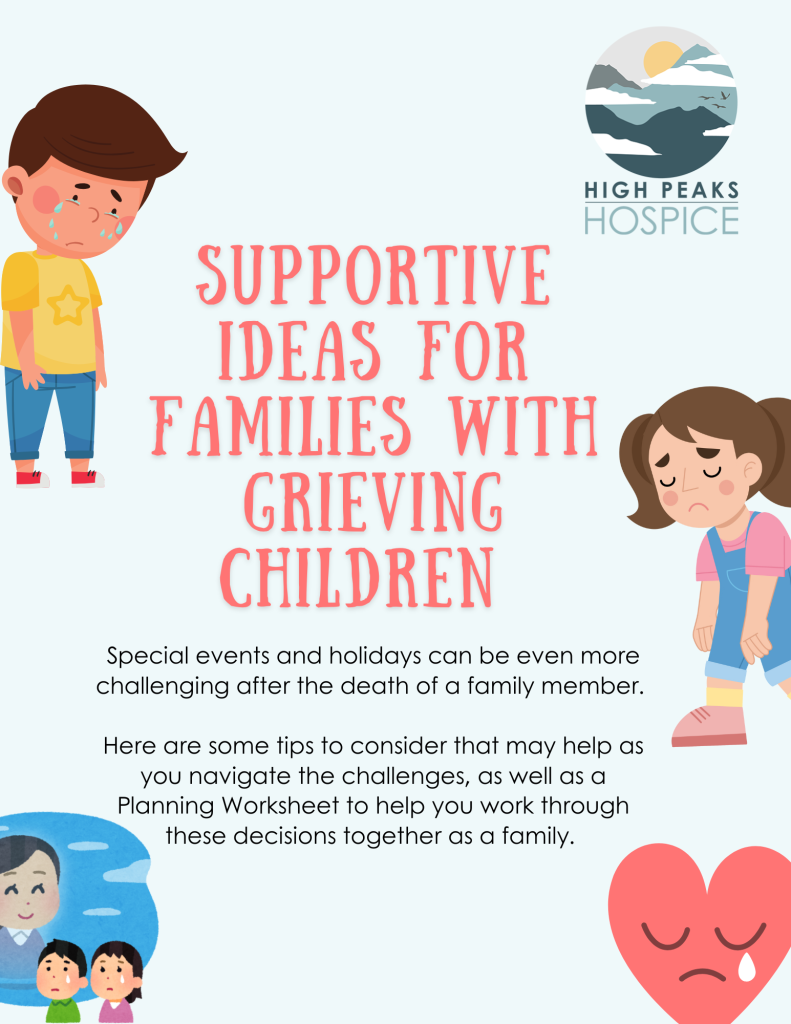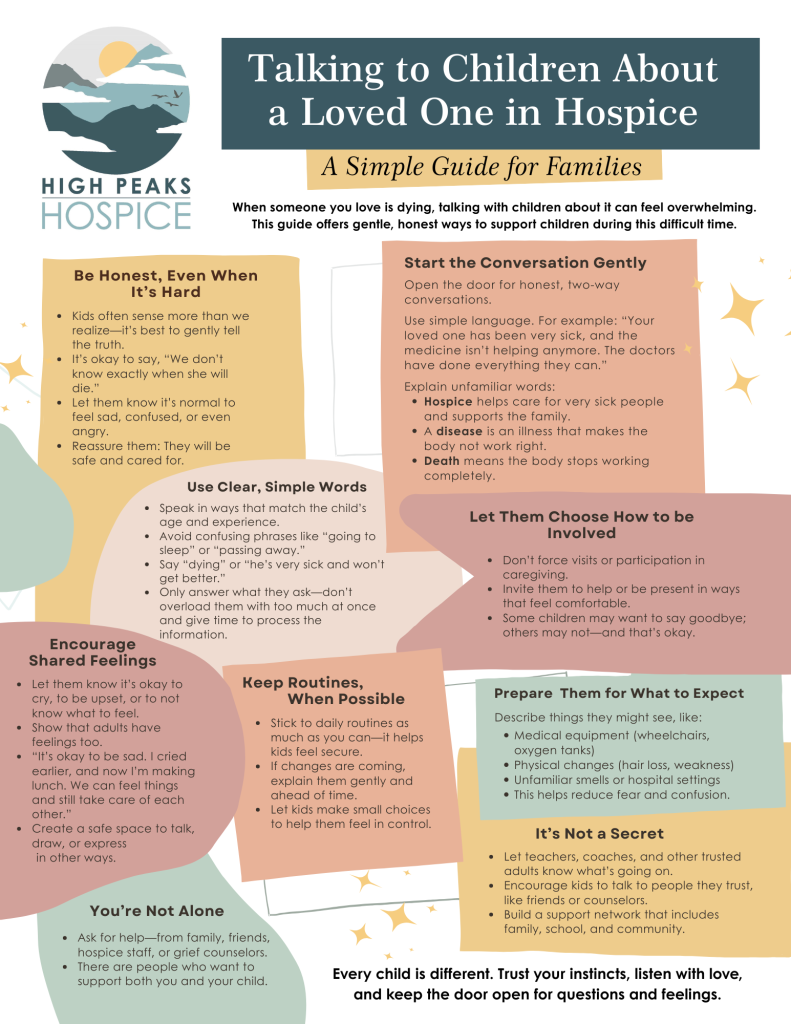Supporting children through their grief
Abra-cadabra. Open Sesame. There is no magic word we can say to help someone move through grief. Grief is a personal journey for every individual, regardless of age. Coping with loss presents challenges for the whole family. Children may not be able to put words to their big feelings and emotions, and they may not understand what is happening. With support, open conversations, and finding ways to keep the missing loved one present, families can move through grief together.
Through the willingness to answer difficult questions, explaining and reassuring, discussing emotions, noticing signs of stress, and showing you care – trusted adults can help children journey through grief.
Everyone grieves differently, and there is no “best” way to grieve, just as there is not a timeline. A child’s developmental stage, temperament, and relationship with the person they are missing are factors in how the loss is felt and expressed. It is a very individual process and differs from child to child, or situation to situation.
Answering Difficult Questions:
While trusted adults cannot take away a child’s difficult thoughts and feelings, you can make sure that the children know that you are listening and are available to them to share their feelings, worries, and questions.
Be patient with the child and with yourself. Moving through grief is a process, and you may also be grieving. Children may ask the same questions repeatedly. It is best to answer honestly, giving age-appropriate information.
Listen. The best thing a trusted adult can do is listen when the child speaks. Sometimes, the child may not have the words to explain how they are feeling. Create a safe space and time for them to explore their emotions. You can offer to draw, offer to listen to whatever they want to say, and allow them to explain their thoughts without interjecting too often. If you aren’t sure what the child is asking, ask for clarification.
It’s OK that you may not have all the answers or may not be ready to answer a question. Be honest. If you don’t know the answer, say “I don’t know, what do you think?” as this gives the child the ability to share his thoughts and feelings. It’s better to say you don’t know than to guess or make something up. If you tell the child that you will find out the information, try to do so. Don’t make promises that you can’t keep.
Signs that a child may need more support
Grieving is a natural process and takes time. Grieving is not an illness but symptoms that persist beyond six months or are very impairing to the child may indicate that the child may have needs that aren’t being met by current means. Professional support may help them move through the grieving process and work with their emotions.
These signs that a child may need more support can show up months or years after a loss:
- The child cannot be comforted
- Inability to sleep, prolonged fear of being alone
- Poor concentration
- Ongoing behavior problems
- Persistent regression to earlier behavior in young children, such as clinging, bedwetting, or thumb-sucking
- Excessively imitating the dead person
- Sharp drop in school performance or refusal to attend school
- Extended periods of depression –while sadness is normal, a prolonged loss of interest in previously enjoyed activities could be a sign that a child is struggling.
- Grief symptoms grow worse over time: grief signs should gradually diminish over time. If the symptoms are getting worse, a professional may be able to help the child cope with their feelings.
- Repeatedly expressing a desire/need to join the deceased person: if the child says they want to be dead or wish to be dead, it is important to get professional help.
Resources to View/Download – Click each image to open in new tab
Online Resources & Books
Dougy Center for Grieving Children and Families
Center for Loss & Life Transition
Books for Children for Anticipatory Grief:
Age 2 – 5
- Lifetimes: A Beautiful Way to Explain Death to Children by Bryan Mellonie
- Where Do They Go? by Julia Alvarez
- The Invisible String by Patrice Karst
Ages 5 – 7
- Gentle Willow by Joyce C. Mills
- My Best Friend Teddy by Denise Gordon
- Our Baby is Loved: A story for children whose parents or loved ones are expecting a baby with a life-threatening medical condition by Abigail Gellene-Beaudoi
- When Hope Changes: A story for children whose loved one is dying or has a terminal illness by Abigail Gellene-Beaudoi
- Cinnamon Roll Sunday: A Child’s Story of Anticipatory Grief by Jenni Allen
- Fox and the Feather / El Zorro y la Pluma by Kendall Lanning
Ages 7 – 12
- Flamingo Dream by Donna Jo Napoli
- Mommy Has Cancer: What I Learned about Cancer, and How I Helped My Mommy by Corey Stevenson
Teens & Young Adults
- My Parent Has Cancer and It Really Sucks by Marc Silver and Maya Silver
- 37 Things I love (in no particular order) by Kekla Magoon
- Dancing at the Pity Party: A Dead Mom Graphic Memoir by Tyler Feder
- Crying in H Mart by Michelle Zauner
Caring Bridge is a free, not-for-profit website that allows you to connect with friends and family using a personal, password protected site. Caring Bridge is similar to a personalized, private social network. You can merely share information with family and friends or you may even create a support group with them. Rather than constantly phoning and texting those closest to you, Caring Bridge allows you to connect with all of those you most want to keep in touch with at one time.
To find out more, click here to be directed to the Caring Bridge website.




